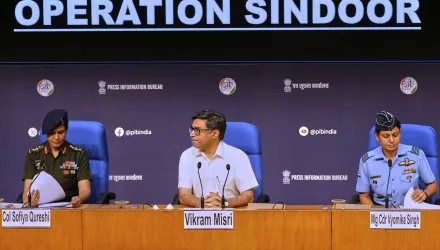The military option against Iran is a problematic, complex, dangerous, and controversial option. The decision to carry it out requires answers to difficult questions: What military capability is there of carrying it out with a high chance of success? Can qualitative and accurate intelligence be obtained that will make it possible to carry it out? How will Iran respond to the attack? Assuming that Iran tries to rebuild its damaged nuclear facilities, how much time will it take to rebuild them, and by how much will Iran’s breakout to a bomb be delayed? Will the United States or Israel be willing to attack the nuclear facilities, and under what conditions? Alternatively, under what conditions, if any, will the United States give Israel a green light to attack?
Given the problems with the military operation, only two countries have seriously considered it, or at least are not ruling it out: the United States and Israel. Both have made similar statements: all options for preventing Iran from obtaining a nuclear weapon are open, including the military option. Most other governments oppose a military strike, though it is possible that some European governments might decide to support it under the right conditions.
There is a difference, however, between the American and Israeli attitudes toward a military operation. The American government has been asserting for nearly a decade that even if the military option is on the table, the conditions for carrying it out are not ripe. Israel, on the other hand, has not defined conditions for a military attack against Iran, and criticizes the American administration for undermining the credibility of the military option by emphasizing the risks and drawbacks of a military attack. The difference between the United States and Israel consists, among other things, of the timing. The American administration is most likely to carry out an attack if Iran seeks to produce weapons grade materials for a bomb. Israel, on the other hand, holds that it will be necessary to attack Iran earlier, so that Iran will be unable to break out to a bomb. When Iran is already close to producing weapons quality fissile material, the Israeli position states, the process cannot be stopped.
The current American administration has given three main reasons for objecting to a military operation. The first is that an attack against the nuclear facilities will not halt the nuclear program, but merely delay it for a limited period. If Israel attacks, the delay will be only a year or two; if the US attacks, the delay would be only a few years longer. The second reason is that the expected Iranian response to an attack could lead to general military escalation in the Middle East. The administration is concerned that Iran’s response could include not only firing missiles and rockets against Israel, but also attacks against targets of the U.S. and its allies in the Persian Gulf, which will require an American counter response and potentially produce a crisis in the oil market. Third, the American administration argues that an attack is liable to motivate Iran to accelerate its nuclear program, give it stronger reasons to produce nuclear weapons, and provide a justification to withdraw from the NPT. For these reasons, the administration also objects an Israeli attack, fearing that it will itself become involved in a conflict as a result of an Iranian response against American targets, or because it will have to help Israel.
Israel believes otherwise. Israeli defense experts estimate that a successful attack against Iran will delay the Iranian nuclear program for a longer period than the American administration believes – possibly 3-5 years. Furthermore, the United States has upgraded capabilities for conducting not merely one attack in Iran, but a series of attacks that will delay Iran’s nuclear program for a longer period, and possibly stop it altogether. In Israel's view, the scenario of a general escalation in the Middle East following an attack is also unlikely, because it ignores factors that will limit Iran's response. A surgical strike is likely to reduce the dimensions of the conflict because Iran’s response capability is limited and because Iran is likely to avoid actions that could lead to a large-scale conflict with the United States.
The negotiations during the past two years, especially the nuclear agreement concluded by the six governments with Iran, have had a significant effect on the possibility of carrying out a military attack – by both the United States and Israel. The American administration seldom mentioned the military option in public during the talks, presumably out of a desire to avoid upsetting the atmosphere in the talks. More importantly, as the agreement emerged, and especially after it was finalized, President Obama and Secretary of State Kerry made it clear that a military attack against Iran would be ineffective, because it would halt Iran’s nuclear program for only a limited period. Kerry repeatedly warned Israel against an independent military operation that would have grave results for Israel and the region, and provide justification for Iran to produce a nuclear weapon. It is clear that the criticism of the military option by the administration leaders was designed to justify the agreement with Iran on the eve of the Congressional review as the most effective way of dealing with the nuclear issue and denying Iran a nuclear weapon. At the same time, there is no doubt that for all practical purposes, devaluing the military operation is detracting from its credibility with the Iranians, who might calculate they can cheat or renege on the agreement with less risk of suffering a military attack.
Nevertheless, now that the agreement has been concluded, the administration is trying to put the possibility of a credible military option back on the table. The leaders of the US military establishment, headed by Secretary of Defense Ashton Carter and recently retired Chairman of the Joint Chiefs of Staff General Martin Dempsey, emphasized in July 2015 that the United States had the capability of destroying the Iranian nuclear program if Iran attempts to violate the agreement or engages in aggression. It can be assumed that the emphasis on the military option after the agreement was achieved is designed to counter criticism of the agreement during the Congressional debate and to reassure Congress and allies in the region that the U.S. is committed to strong enforcement of the agreement.
At the same time, the talks on the Iranian nuclear issue, especially the agreement reached, have also damaged the credibility of a military option by Israel, for three reasons. The first is that it is clear that as long as serious negotiations continue, and certainly after an agreement was reached, Israel cannot initiate a military strike against Iran, because it would be accused of attempting to destroy the agreement. Second, even if Israel stages a successful attack against Iran, it will then need significant American aid. This aid will be needed to consolidate the results of the attack and prevent the rebuilding of the Iranian nuclear program, counter an Iranian military response, and cope with Israel’s possible diplomatic isolation. An Israeli attack opposed by the American administration will severely damage the latter’s relations with Israel and willingness to provide aid. Third, under these circumstances, Iran’s concern about an Israeli military attack will be greatly reduced, although it will not disappear altogether.
The former Israeli Minister of Defense, Ehud Barak, has recently disclosed two additional difficulties that Israel might face regarding the military option. First, Barak argued in a cabinet session by late 2012 that if Israel did not attack in Iran within a short period of time, it was doubtful whether a strike could take place in the future. The reason was that Iran might enter into what Barak had defined "the zone of immunity," by improving the protection of its nuclear sites and enlarging its enriched uranium inventory. Barak therefore believes that Israel's capability to attack in Iran still exists, yet it is now more limited. And second, the discussions in the Israeli cabinet had exposed severe disagreements regarding a military operation, especially when key figures in the defense establishment opposed the operation.
This does not mean that the military option has come to an end. A White House spokesman emphasized in July 2015 that the military option remains on the table, and that the agreement would strengthen this option if Iran violates the agreement. In any case, it is clear that observance of the agreement by Iran will be the main factor affecting the materialization of the military option, or alternatively in taking it off of the table. It therefore follows that as long as Iran is complying with the agreement, there will be no room or reason for an attack against the nuclear facilities by either the United States or Israel.
Even in a case of Iran violating the agreement, however, the situation is complex and problematic, especially for the American administration. First of all, what violation will be considered as justifying a military strike against Iran? It is reasonable to assume that Iranian activity indicating a break out to a nuclear weapon, such as uranium enrichment to a military level, expulsion of the International Atomic Energy Agency (IAEA) inspectors from the Iranian facilities, or revoking Iran’s signature on the Non-Proliferation Treaty, will be considered by the administration as a red line requiring a military response. Will the American administration, however, respond with a military attack to violations perceived as less serious such as enlarging the store of enriched uranium or increasing the number of installed centrifuges beyond what was agreed? Most likely, the U.S. would try to use economic sanctions and political pressures to rectify less important violations of the agreement.
Second, even in a case of a gross Iranian violation of the agreement, a military operation from the United States will probably not be forthcoming immediately. It is reasonable to assume that other means of pressure will precede it, in particular reinstating sanctions and an issuing ultimatum to Iran to address the violation. The entire process will take time for detecting the Iranian measures, reaching agreement on their significance, negotiating with Iran to retract its measures, and attempting to reach international agreement on the measures to be taken against Iran, when it is doubtful whether the other governments that signed the agreement will alter their opposition to a military operation. There is an especially important question in this matter: President Obama is committed to preventing Iran from obtaining a nuclear weapon, and will remain committed to this in the future. We do not know, however, who the next presidents of the United States will be, and whether he or she will prefer a policy of containment to one of prevention, which would mean, among other things, avoidance of a military operation.
Third, the time that will pass is liable to be of critical importance in certain situations – if Iran succeeds in secretly obtaining a bomb, or even a store of fissile material sufficient for a bomb. In this case, it may be too late for a military attack, because Iran can try to conceal the bomb, and it cannot be guaranteed that the attack will achieve full success. The time that will pass before a decision whether to attack will also be significant for the military capabilities of both sides. During this period of time, Iran is liable to improve its defense of the sites, including through the installing of advanced air defense systems. The question will be whether the gap between American attack capability and Iranian defense capability will widen or narrow during this time.
Finally, the main consideration that the American administration is currently presenting for refraining from a military operation is the limited effectiveness of an attack on the nuclear sites and concern about ensuing general escalation in the Middle East. The problem is that these considerations will not necessarily lose their validity in the coming years, and the question is what weight they will have if and when the administration is forced to decide on a military operation.
Israel’s considerations concerning a military operation will be in part similar to the American considerations. Israel will find it difficult to attack Iran as long as the agreement exists, and as long as it has not been proven that Iran committed a gross violation of the agreement terms and has begun to adopt measures towards breakout to nuclear weapons. Since Israel regards the possibility of Iran acquiring nuclear weapons much more seriously, however, and since it is not a party to the agreement, and has already announced that the agreement is not binding on Israel, Israel’s timetable for a military operation is likely to be shorter. It will also be shorter for another reason: it is also important for Israel to assess the gap between its attack capabilities and Iran’s defensive capabilities. Since it can be assumed that Israel’s military capabilities are inferior to those of the United States, it is possible that Israel can wait less time than the United States before attacking in order not to miss the opportunity.
It therefore follows that the question of the military option against Iran is liable to be a bone of contention between the United States and Israel. The controversy is likely to focus on a number of questions: What violation will justify military action? Is Iran really breaking out to nuclear weapons? Will it eventually be necessary to conduct a military operation, and if so, when should it be conducted, and by who? For Israel, there is another crucial question: will the United States eventually decide to carry out an attack against the nuclear sites by itself, and if it decides not to, will it give Israel a green light for action? Alternatively, if it turns out that the United States opposes an attack on Iran, can Israel afford to attack even without the consent of the American administration, and perhaps without given the U.S. advance notice?
At the bottom line, the signing of the agreement will put the military option into a state of suspension for both the United States and Israel. This situation may last for years, with the key being the degree to which Iran complies with the agreement. The military option, however, will not be buried. It will be the right thing for both governments to preserve and reinforce it in case the arrangements in the agreement are loosened or collapse, particularly as a result of a decision by Iran to breakout to nuclear weapons. Even then, exercising the military option will not be automatic, and will involve difficult deliberation. Therefore, the two governments should discuss and try to define in advance for themselves and coordinate between them under what conditions and for which objectives military action will be employed.
Samore, Gary and Ephraim Kam. “What Happened to the Military Option Against Iran?.” September 29, 2015




